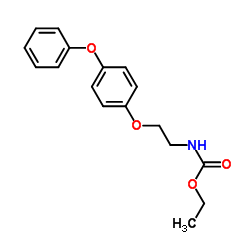fenoxycarb

fenoxycarb structure
|
Common Name | fenoxycarb | ||
|---|---|---|---|---|
| CAS Number | 72490-01-8 | Molecular Weight | 301.337 | |
| Density | 1.1±0.1 g/cm3 | Boiling Point | 447.3±55.0 °C at 760 mmHg | |
| Molecular Formula | C17H19NO4 | Melting Point | 53-54ºC | |
| MSDS | Chinese USA | Flash Point | 224.3±31.5 °C | |
| Symbol |


GHS08, GHS09 |
Signal Word | Warning | |
| Name | fenoxycarb |
|---|---|
| Synonym | More Synonyms |
| Density | 1.1±0.1 g/cm3 |
|---|---|
| Boiling Point | 447.3±55.0 °C at 760 mmHg |
| Melting Point | 53-54ºC |
| Molecular Formula | C17H19NO4 |
| Molecular Weight | 301.337 |
| Flash Point | 224.3±31.5 °C |
| Exact Mass | 301.131409 |
| PSA | 56.79000 |
| LogP | 4.30 |
| Vapour Pressure | 0.0±1.1 mmHg at 25°C |
| Index of Refraction | 1.532 |
| InChIKey | HJUFTIJOISQSKQ-UHFFFAOYSA-N |
| SMILES | CCOC(=O)NCCOc1ccc(Oc2ccccc2)cc1 |
CHEMICAL IDENTIFICATION
HEALTH HAZARD DATAACUTE TOXICITY DATA
|
| Symbol |


GHS08, GHS09 |
|---|---|
| Signal Word | Warning |
| Hazard Statements | H351-H410 |
| Precautionary Statements | P273-P391-P501 |
| Personal Protective Equipment | Eyeshields;Gloves;type N95 (US);type P1 (EN143) respirator filter |
| Hazard Codes | N: Dangerous for the environment; |
| Risk Phrases | R50/53 |
| Safety Phrases | 60-61 |
| RIDADR | UN 3077 9 / PGIII |
| RTECS | FD0423000 |
| HS Code | 2922499917 |
| HS Code | 2924299090 |
|---|---|
| Summary | 2924299090. other cyclic amides (including cyclic carbamates) and their derivatives; salts thereof. VAT:17.0%. Tax rebate rate:13.0%. . MFN tariff:6.5%. General tariff:30.0% |
|
Tweedle cuticular protein BmCPT1 is involved in innate immunity by participating in recognition of Escherichia coli.
Insect Biochem. Mol. Biol. 58 , 76-88, (2015) Bombyx mori, a lepidopteran insect, is one of the earliest models for pattern recognition of Gram-negative bacteria, which may induce the IMD pathway for production of antibacterial peptides. So far, ... |
|
|
Timing matters: sensitivity of Daphnia magna dormant eggs to fenoxycarb exposure depends on embryonic developmental stage.
Aquat. Toxicol. 159 , 176-83, (2015) Although Daphnia magna is a key species in many lentic freshwater ecosystems and is commonly used as model organism in ecology and ecotoxicology, very little is known about the effects of chemicals on... |
|
|
Population growth rate responses of Ceriodaphnia dubia to ternary mixtures of specific acting chemicals: pharmacological versus ecotoxicological modes of action.
Environ. Sci. Technol. 46(17) , 9663-72, (2012) When considering joint toxic apical effects at higher levels of biological organization, such as the growth of populations, the so-called pharmacological mode of action that relies on toxicological me... |
| Ethyl hydrogen [2-(4-phenoxyphenoxy)ethyl]carbonimidate |
| FENOXYXARB |
| ABG-6215 |
| carbamic acid, [2-(4-phenoxyphenoxy)ethyl]-, ethyl ester |
| [2-(4-Phenoxyphenoxy)ethyl]carbamic acid ethyl ester |
| Ethyl [2-(4-phenoxyphenoxy)ethyl]carbamate |
| Methanol, 1-ethoxy-1-[[2-(4-phenoxyphenoxy)ethyl]imino]-, (Z)- |
| fenoxycarb |
| Carbamic acid, N-[2-(4-phenoxyphenoxy)ethyl]-, ethyl ester |
| MFCD00144303 |
| Fenoxycarb [ANSI] |